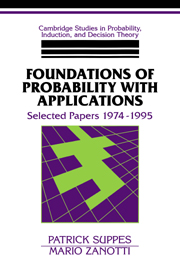Book contents
- Frontmatter
- Contents
- Preface
- Part I Foundations of probability
- Part II Causality and quantum mechanics
- 6 Stochastic incompleteness of quantum mechanics
- 7 On the determinism of hidden variable theories with strict correlation and conditional statistical independence of observables
- 8 A new proof of the impossibility of hidden variables using the principles of exchangeability and identity of conditional distributions
- 9 When are probabilistic explanations possible?
- 10 Causality and symmetry
- 11 New Bell-type inequalities for N > 4 necessary for existence of a hidden variable
- 12 Existence of hidden variables having only upper probabilities
- Part III Applications in education
- Author Index
- Subject Index
10 - Causality and symmetry
Published online by Cambridge University Press: 05 June 2012
- Frontmatter
- Contents
- Preface
- Part I Foundations of probability
- Part II Causality and quantum mechanics
- 6 Stochastic incompleteness of quantum mechanics
- 7 On the determinism of hidden variable theories with strict correlation and conditional statistical independence of observables
- 8 A new proof of the impossibility of hidden variables using the principles of exchangeability and identity of conditional distributions
- 9 When are probabilistic explanations possible?
- 10 Causality and symmetry
- 11 New Bell-type inequalities for N > 4 necessary for existence of a hidden variable
- 12 Existence of hidden variables having only upper probabilities
- Part III Applications in education
- Author Index
- Subject Index
Summary
This paper is concerned with inferences from phenomenological variables to hidden causes or hidden variables. A number of theorems of a general sort are stated. The paper concludes with a treatment of Bell's inequalities and their generalization to more than four observables.
INTRODUCTION
In this paper we are concerned to present a number of theorems about inferences from phenomenological correlations to hidden causes. In other terms, the theorems are mainly theorems about hidden variables. Most of the proofs will not be given but references will be cited where they may be found.
To emphasize conceptual matters and to keep technical simplicity in the forefront, we consider only two-valued random variables taking the values ±1. We shall also assume symmetry for these random variables in that their expectations will be zero and thus they will each have a positive variance of one. For emphasis we state:
GENERAL ASSUMPTIONThe phenomenological random variables X1, …, XN have possible values ±1, with means E(Xi) = 0, 1 ≤ i ≤ N.
We also use the notation X, Y, and Z for phenomenological random variables. We use the notation E(XY) for covariance which for these symmetric random variables is also the same as their correlation ρ(X, Y).
Information
- Type
- Chapter
- Information
- Foundations of Probability with ApplicationsSelected Papers 1974–1995, pp. 113 - 121Publisher: Cambridge University PressPrint publication year: 1996
